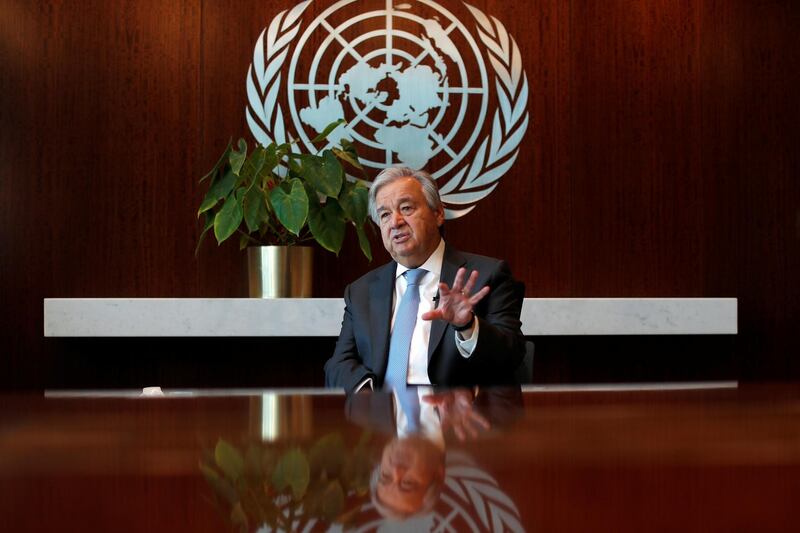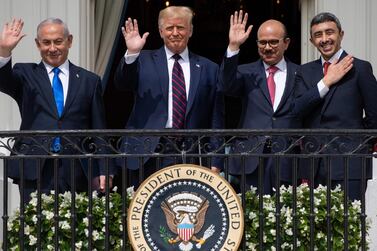Uncertainty is preventing UN Secretary General Antonio Guterres taking any action on a US declaration that all international sanctions had been reimposed on Iran he has told the Security Council.
US Secretary of State Mike Pompeo said last month that he triggered a 30-day process at the Security Council to return UN sanctions on Iran by Saturday evening. The move is aimed at stopping a conventional arms embargo on Tehran from expiring on October 18.
But 13 of the 15 Security Council members say Washington's move is void because Mr Pompeo used a mechanism agreed under a 2015 nuclear deal between Iran and world powers that the US quit in 2018.
"There would appear to be uncertainty whether or not the process was indeed initiated and concomitantly whether or not the [sanctions] terminations ... continue in effect," Mr Guterres wrote in a letter to the Security Council, seen by Reuters.
"It is not for the Secretary General to proceed as if no such uncertainty exists," he said.
The E3 🇩🇪🇫🇷🇬🇧 note that the US ceased to be a participant to the JCPoA following their withdrawal on 8 May, 2018. Consequently, the US attempt to initiate the ‘snapback mechanism’ is incapable of having any legal effect. We remain committed to preserve the nuclear agreement. pic.twitter.com/N3LnmwRT5d
— GermanForeignOffice (@GermanyDiplo) September 20, 2020
UN officials provide administrative and technical support to the Security Council to carry out its sanctions regimes and Mr Guterres appoints independent experts to monitor their introduction. He said that pending clarification of the status of the Iran sanctions, he would not take any action to provide that support.
Washington argues it triggered the return of sanctions, known as a snapback, because a UN resolution that enshrines the pact still names it as a participant.
Iran hit back at the US on Sunday, with President Hassan Rouhani echoing the White Houses' “maximum pressure” campaign of sanctions saying it was on the verge of defeat and “maximum isolation".
"America is approaching a certain defeat in its sanctions move ... It faced defeat and negative response from the international community," Mr Rouhani said on television. "We will never yield to US pressure and Iran will give a crushing response to America's bullying," he said.
He praised the UN Security Council's approach to the issue as "very valuable" as it ignored "America's request [and] held no session to consider their request".
Despite the bellicose rhetoric from Tehran, the Iranian rial dropped to a record low against the US dollar.
The US currency was offered for as much as 273,000 rials, up from 267,800 rials on Saturday, according to foreign exchange site Bonbast.com, which tracks the unofficial market.
On the streets of Tehran, Iranians complain of harsh economic conditions they blamed on US sanctions.
"It's really difficult for the people right now. Whether sanctions are reimposed or not, we are living with utmost difficulty," said Leila Zanganeh, a martial arts instructor.
But Danial Namei, an architect, seemed to care little for returning UN sanctions and doubted things could get worse.
"We've been through difficult things and it is still ongoing. There's nothing worse than the worst, after all," he said.
Diplomats say few countries are likely to reimpose the measures lifted under the 2015 deal, which aimed to stop Iran from developing nuclear weapons.
"If UN member states fail to fulfil their obligations to implement these sanctions, the United States is prepared to use our domestic authorities to impose consequences for those failures," Mr Pompeo said on Saturday.
He said that in the coming days Washington would announce additional measures to strengthen the introduction of the UN sanctions and hold those who breach them accountable.
The US is trying to push Iran to negotiate a new deal with Washington. President Donald Trump has said that if he wins the election in November he expects Iran will come to the table.
He walked out on the 2015 nuclear deal in 2018 and hit Iran with punishing sanctions that has put a stopper on its exports of oil and pushed the economy to the brink of collapse. Mr Rouhani has admitted that this, coupled with the Covid-19 pandemic, means Iran faces its toughest year ever.
But Iran's foreign ministry said Washington, by leaving the nuclear deal, had "explicitly denied itself any right" to use the "snapback" mechanism.
With around six weeks to go until the US presidential election, Mr Trump could unveil additional measures in a speech at the UN General Assembly on Tuesday.
The US already suffered a resounding defeat at the Security Council in mid-August, when it tried to extend an embargo on the conventional weapons deliveries to Tehran.
At the time, Mr Pompeo responded with an unusually vehement attack on Britain, France and Germany, accusing them of "siding with Iran's ayatollahs", before announcing the snapback.
Russia's Deputy UN Ambassador Dmitry Polyanskiy commented on the latest US move on Twitter, saying: "We all clearly said in August that US claims to trigger snapback are illegitimate. Is Washington deaf?"
Longtime US allies Britain, France and Germany told the Security Council on Friday that UN sanctions relief for Iran would continue and that any decision or action taken to reimpose UN sanctions "would be incapable of legal effect".







